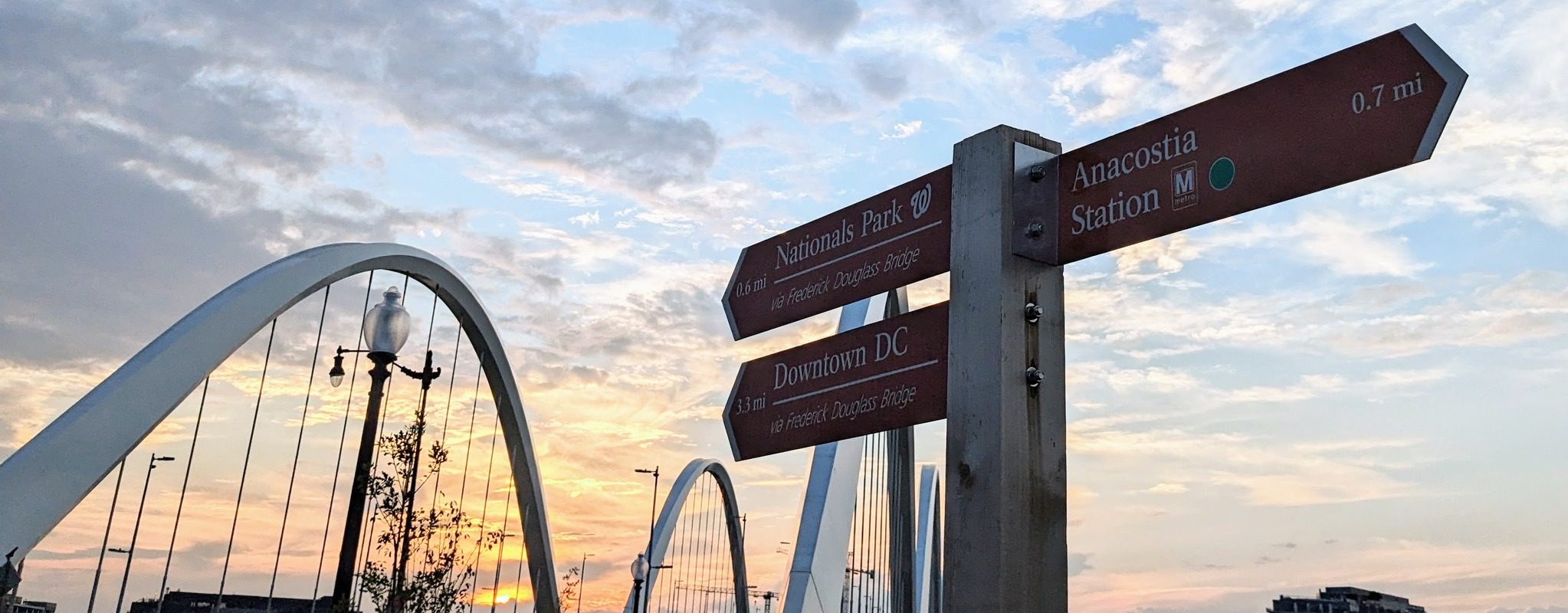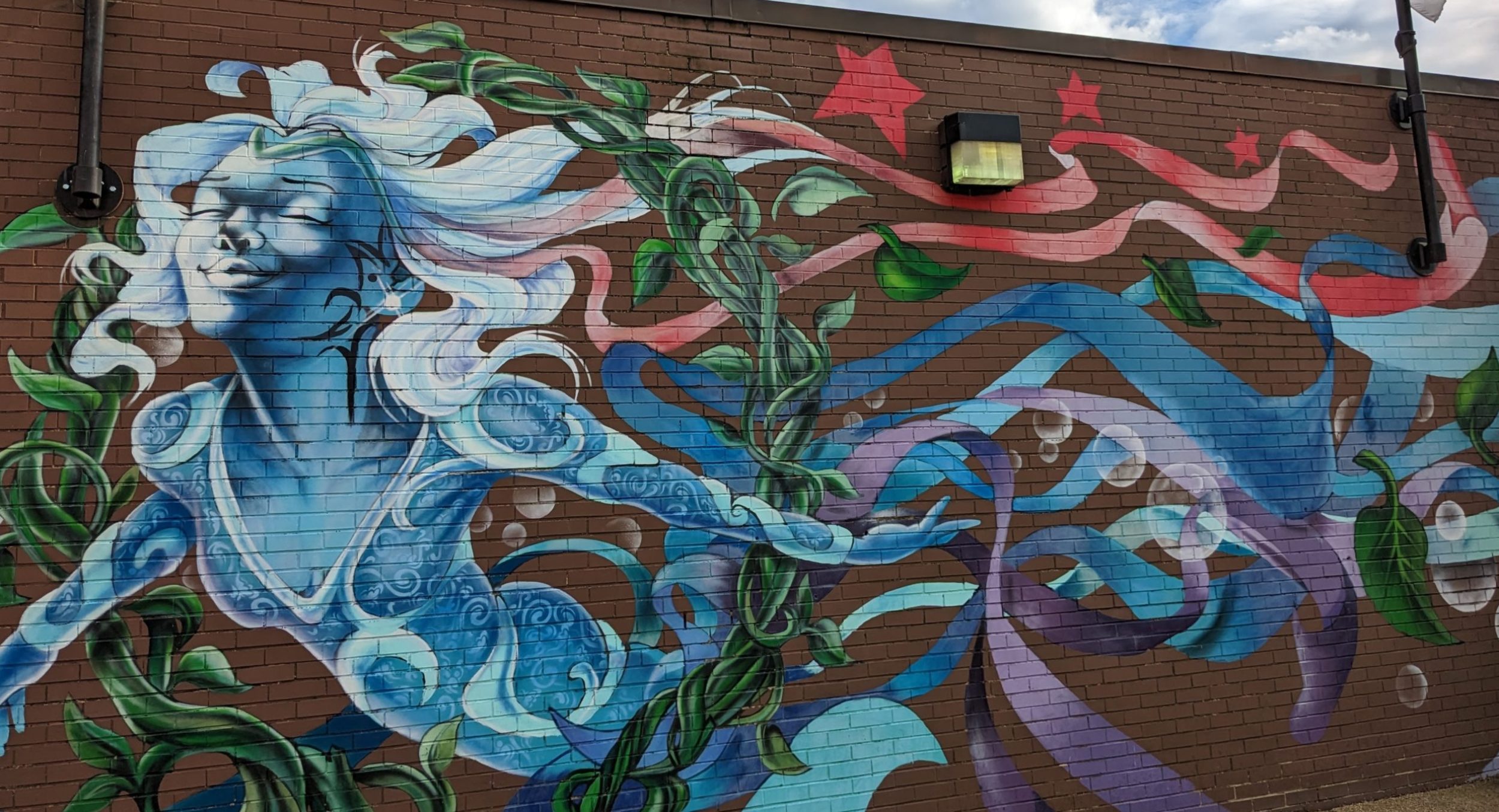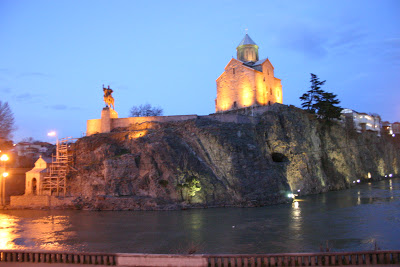 “Still in peaceful dreams I see“… the Georgia that my husband and I left in 2007.
“Still in peaceful dreams I see“… the Georgia that my husband and I left in 2007.
The Republic of Georgia took us by surprise on our four-month 2007 trip around the world. David and I came home committed Georgiaphiles, if there is such a word. Before the crisis with Russia erupted, we’d try to persuade anyone we knew with a yen for travel to visit Georgia, (often pronounced George-ee-a). “Combine it with Turkey,” we’d advise. “Make it a side trip if you go to Germany.” David’s become such a fan of Georgian food that he made an arrangements with a neighbor of ours to harvest sour plums from a tree outside of her house. He needs them to make the sauce for our favorite Georgian dish, a tarragon-laced lamb stew known as chakapuli.
We were hooked on Georgia from our first day there. Our dinner that night in the capital city of Tbilisi was one of the best meals of our lives. The restaurant looked out at the church shown in this picture. There were musicians in the restaurant playing violin and piano, as savory dish after dish arrived at our table. After learning we were Americans, they played the song, “Feelings,” for us. An odd choice, we thought, but a warm gesture.
There was no shortage of beautiful things to see in Georgia. Its centuries-old churches are filled with paintings that would be in museums elsewhere.
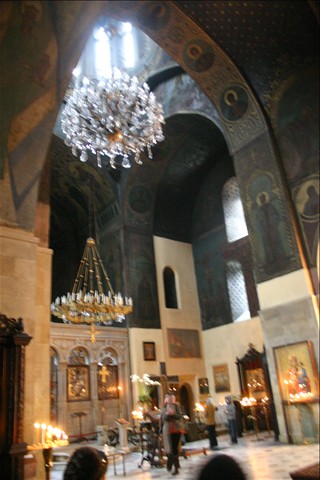 In the days ahead of Easter, the churches fill with people, some of whom make their way from icon to icon inside the church on their knees. There were grand buildings in Tbilisi, and interesting landscapes in the countryside.
In the days ahead of Easter, the churches fill with people, some of whom make their way from icon to icon inside the church on their knees. There were grand buildings in Tbilisi, and interesting landscapes in the countryside.
Still, Georgia’s biggest attractions are its generous people, a cuisine that must be counted among the world’s best, and the optimism generated through a recent burst of reforms. Georgia seems the rare place where the government has been working seriously to make its country better. That makes the current battles with Russia all the more heartbreaking. In addition to the deaths and suffering from the battles, there is the time and work that the government will need to divert from its reform efforts to rebuilding what’s been damaged and helping the people who were driven from their homes.
Georgia vaulted to the 18th spot in 2007 from the 137th spot in 2004 on the World Bank’s “Doing Business” ranking of countries, based on how free 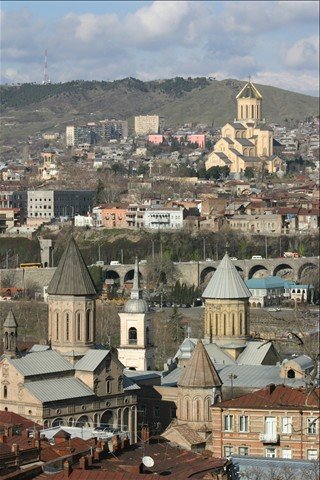 they are for businesses. The U.S. State Department has described what happened in Georgia as “a nearly failed state” that’s become “a rapidly maturing market democracy.” While noting that problems remain with voter lists, abuse of administrative resources, media access, and intimidation of voters, the State Department’s Web site says that Georgian elections have been judged to be largely free and fair. The government is fighting “endemic corruption,” and there is a fair examination system used for selecting students for universities.
they are for businesses. The U.S. State Department has described what happened in Georgia as “a nearly failed state” that’s become “a rapidly maturing market democracy.” While noting that problems remain with voter lists, abuse of administrative resources, media access, and intimidation of voters, the State Department’s Web site says that Georgian elections have been judged to be largely free and fair. The government is fighting “endemic corruption,” and there is a fair examination system used for selecting students for universities.
Driving some of that reform has been a Georgian native named Kakha (pronounced like Kahhza) Bendukidze, who developed a successful business in Russia before accepting a request to head home in 2004 and become the economics minister. He’s known for his dictate on reform —that Georgia must be ready to “sell everything but its conscience. “
David and I first learned about Bendukidze at a May 2008 event at the Cato Institute. With almost a throwaway line in a talk heavy with details on economic reforms, Bendukidze explained how Georgia had dealt with its “bribe-taking” division of road police. “In one day, all of these people were fired,” he said. For three weeks, there were no road police, he said, adding:
His talk confirmed some impressions we had from our trip. At post on the Georgian-Armenian border, there are giants signs asking people to report any corruption that they saw. If memory serves, they had contact information for turning into Georgian officials any Georgian officer who sought a bribe. The few government representatives whom we met in Georgia had a professional and friendly attitude. The very first Georgian we had met had been the young officer who handled our passports on the overnight train from Azerbaijan. Wearing what looked like a surplus U.S. Army uniform, he was a blond kid with the plump sweet face of a cherub and polite manners. There was a lot of laughter as we tried to explain, using the few words we all shared and a lot of pantomime, what was the purpose of the fireplace bellows that David had in his bag, a souvenir from our time in Morocco earlier in the trip.
There’s no visa required for Americans visiting Georgia, something we’d later hear Bendukidze talk of with pride. But, we did need to fill out an entry form on the train, which the officer walked us through. It was in Georgian – a language with its own alphabet, which looks a lot like fish hooks and astrological symbols. The officer’s manner put us at ease, so we paid him a rare compliment. Skeptics though we are, David and I signed where the officer told us to sign, while having no idea what the form said.
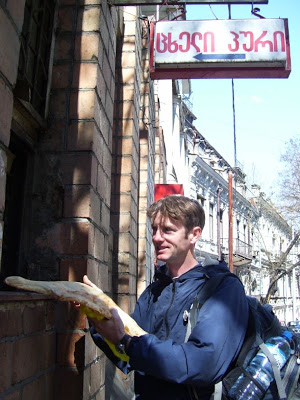 You can see a bit of Georgian writing in the picture to the left. That sign in the top is in Georgian, and there’s my husband below it, buying freshly baked bread from this bakery window in Tbilisi. We’d spotted people in the street walking with loaves and traced the source to that window.
You can see a bit of Georgian writing in the picture to the left. That sign in the top is in Georgian, and there’s my husband below it, buying freshly baked bread from this bakery window in Tbilisi. We’d spotted people in the street walking with loaves and traced the source to that window.
How fresh was the bread? You could see the oven when you went to window to buy bread. That’s Georgian food for you. Every dish seems to have just the right ingredients and is well done. There wasn’t a day in Georgia when we didn’t discover a new amazing dish, while also testing out how different restaurants made our favorite, chakapuli.
The best batch was in little lunch place, Ojaxuri Cafe, in Gori, seemingly run by the woman who waited on us. We’d been out in the rainy cold before entering her restaurant, where she served us in a little private dining area made by hanging curtains around a table and chairs. Tea and savory stews warmed us right up.
It could have been one of those ugly travel days, with us getting stuck by the side of road in the rain for a long time. Instead, the taxi driver who took us out to the highway gestured for me to stay put and he got out with David. I watched from inside the warm car, as David and the driver stood by the side of the highway in the rain for many minutes, looking for a van in the distance. Our taxi driver then explained to the van driver where we were heading, and shrugged off our profusions of thanks before leaving.
Fairy-Tale Setting With a Funky Alphabet. April 2007
Turn Right at the Stalin Statue. April 2007
Stews and Dumplings Cooked in Generosity. April 2007
Hike Along a Disputed Border. April 2007
Other sites of interest:
Page for Cato program
World Bank’s Doing Business Blog
State Department page
Whirled View Blog Posting With Good Roundup of Coverage
“Reign of the Petro-Bully” blog by my husband, David G. Young
